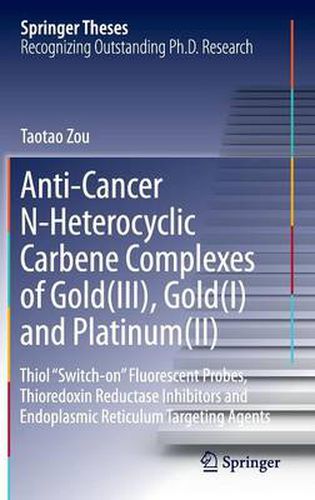Readings Newsletter
Become a Readings Member to make your shopping experience even easier.
Sign in or sign up for free!
You’re not far away from qualifying for FREE standard shipping within Australia
You’ve qualified for FREE standard shipping within Australia
The cart is loading…






This title is printed to order. This book may have been self-published. If so, we cannot guarantee the quality of the content. In the main most books will have gone through the editing process however some may not. We therefore suggest that you be aware of this before ordering this book. If in doubt check either the author or publisher’s details as we are unable to accept any returns unless they are faulty. Please contact us if you have any questions.
This thesis focuses on the development of gold- and non-classical platinum-based anti-cancer agents that display distinctively different anti-cancer mechanisms compared to the commonly used cisplatin. These metal complexes contain N-heterocyclic carbene (NHC) ligands which are able to form strong M-C(NHC) bonds, conferring high stability and favorable lipophilicity, reactivity and binding specificity of metal complexes on biomolecules. The author demonstrates significant advances made in anti-cancer gold(III), gold(I) and platinum(II) complexes. Detailed chemical synthesis, in vitro and/or in vivo anti-cancer activities are clearly presented including: (i) a class of Au(III) complexes containing a highly fluorescent N^N^N ligand and NHC ligand that simultaneously act as fluorescent thiol switch-on probes and anti-cancer agents; (ii) a dinuclear gold(I) complex with a mixed diphosphine and bis(NHC) ligand displaying favorable stability and showing significant inhibition of tumor growth in two independent mice models with no observable side effects; and (iii) a panel of stable luminescent cyclometalated platinum(II) complexes exhibiting high specificity to localize to the endoplasmic reticulum (ER) domain, inducing ER stress and cell apoptosis. These works highlight the clinical potential that gold and platinum complexes offer for cancer treatment.
$9.00 standard shipping within Australia
FREE standard shipping within Australia for orders over $100.00
Express & International shipping calculated at checkout
This title is printed to order. This book may have been self-published. If so, we cannot guarantee the quality of the content. In the main most books will have gone through the editing process however some may not. We therefore suggest that you be aware of this before ordering this book. If in doubt check either the author or publisher’s details as we are unable to accept any returns unless they are faulty. Please contact us if you have any questions.
This thesis focuses on the development of gold- and non-classical platinum-based anti-cancer agents that display distinctively different anti-cancer mechanisms compared to the commonly used cisplatin. These metal complexes contain N-heterocyclic carbene (NHC) ligands which are able to form strong M-C(NHC) bonds, conferring high stability and favorable lipophilicity, reactivity and binding specificity of metal complexes on biomolecules. The author demonstrates significant advances made in anti-cancer gold(III), gold(I) and platinum(II) complexes. Detailed chemical synthesis, in vitro and/or in vivo anti-cancer activities are clearly presented including: (i) a class of Au(III) complexes containing a highly fluorescent N^N^N ligand and NHC ligand that simultaneously act as fluorescent thiol switch-on probes and anti-cancer agents; (ii) a dinuclear gold(I) complex with a mixed diphosphine and bis(NHC) ligand displaying favorable stability and showing significant inhibition of tumor growth in two independent mice models with no observable side effects; and (iii) a panel of stable luminescent cyclometalated platinum(II) complexes exhibiting high specificity to localize to the endoplasmic reticulum (ER) domain, inducing ER stress and cell apoptosis. These works highlight the clinical potential that gold and platinum complexes offer for cancer treatment.